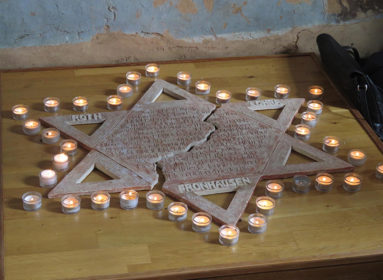Mussar expert comes to West Hartford
By Cindy Mindell
How do we attain our highest purpose as human beings? That kind of question intrigued the Eastern European rabbis who revived the 10th century practice of mussar in the 1800s – an ethical, educational, and cultural practice in response to the social changes inspired by the Enlightenment in Europe.
The Hebrew word “mussar,” which appears in the book of Proverbs, means “instruction,” “discipline,” or “conduct,” and was used by the movement to describe efforts encouraging ethical and spiritual discipline.
The Mussar Movement thrived in Eastern Europe until World War II, when the third generation of rabbi-leaders was all but wiped out by the Nazis. Some students of the movement resettled in Israel, where they established yeshivot based on mussar principles.
The U.S. didn’t see a revival of the movement until this century, when both Orthodox and non-Orthodox communities established organizations and institutions that teach the practice.
Among the new endeavors is the Mussar Institute, founded in Vancouver, British Columbia by Dr. Alan Morinis in 2004.
Morinis, who serves as dean and teacher of the organization, will speak on the path of mussar on Thursday, May 22 in West Hartford.
The crux, as Morinis describes in his book, Everyday Holiness (Trumpeter Books, 2007): “Every one of us is assigned to master something in our lives. You have already been given your assignment and you have already encountered it, though you might not be aware that what faces you is a curriculum, nor that this is the central task of your life.”
The Torah starts us off with the basic, lofty guidelines of what a human life can be: in Genesis 1, God says, “We will make man in our image, after our likeness.” Later, in Leviticus 19, God reminds us, “You shall be holy; for I the Lord your God am holy.”
Mussar is the system of contemplative practices and exercises designed to help one reach that state. Through this inner work, the individual can pinpoint and break through the barriers that surround and obstruct the flow of inner light in one’s life.
“The challenge isn’t acquiring or adding to holiness, but uncovering the light of holiness through middot, or character traits,” Morinis says. Each person is tasked with an individual character-trait curriculum – an angry person needs to learn to be calm, a miserly person needs to learn to be generous, a self-interested person needs to learn to be compassionate. The more balanced one’s middot, the closer one is to holiness.
Morinis grew up in a secular Reform Jewish home in Toronto, Canada, and went on to become a Rhodes scholar, Oxford University graduate, and acclaimed anthropologist and documentary filmmaker.
He stumbled upon mussar at age 47.
“Things had happened in my life that were unsatisfying and I felt a very strong call for guidance; I was feeling alone and very much an individual,” he says. “Even though I was secular, I was very aware of being Jewish. I realized that the Jewish people couldn’t have survived 3,500 years on responsive reading and there had to be more to the tradition.”
He started reading, discovering the mussar practice in a book on the 19th-century movement. “And there was the answer to my question of where does Judaism pay attention providing guidance for the individual soul in life,” he says. “It was very inspiring for me to find that in the Jewish world. To see Judaism as a religion that has a great interest in the inner life of the individual is a paradigm shift, because it tends to focus on the outer expressions – synagogue, community, behavior – and not on the soul.”
Mussar is the bridge between heart and mind, teaching the heart to feel what the intellect knows. The technique, as taught by the Mussar Institute, is a workout focused on strengthening positive character traits, as identified by the mussar masters in the 10th century. Through this consciousness-raising, one brings holiness into everyday life.
At the May 22 program, Morinis will discuss personal transformation, the Jewish way, as presented in Pirke Avot and the Torah.
“This is not just perspectives and ideas and information, but a spiritual workout and practice,” he says. “Life is growth and learning and development. Mussar helps us make that conscious, make the process conscious and deliberate, and aim it toward goals that have been validated by the Jewish world over centuries.”
Alan Morinis, founder and dean of the Mussar Institute, will speak on Thursday, May 22, 7:30 p.m., at Beth David Synagogue, 20 Dover Road, West Hartford | Information: (860) 236-1241.
Comments? email cindym@jewishledger.com.








 Southern New England Jewish Ledger
Southern New England Jewish Ledger










